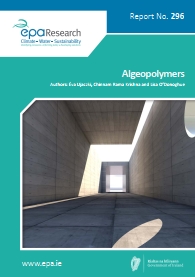Research 296: Algeopolymers
Authors: Éva Ujaczki, Chinnam Rama Krishna and Lisa O’Donoghue
Summary: The Algeopolymers project study focused on a state-of-the-art review related to geopolymers, including the use of wastes and by products as core ingredients in geopolymer products. The objective of the research was to investigate the potential for Irish wastes (fly ash, bauxite residues, etc.) to be used in geopolymer applications and the opportunities for these geopolymer applications within the construction industry in Ireland.

Identifying Pressures
Concrete is the second most widely used material in the world and is made of cement, sand and aggregates. Cement manufacture requires high temperatures and generates substantial CO2 emissions. However, a new class of materials called geopolymers have potential construction applications and generates much lower CO2 emissions. In addition to this benefit there is also the potential for the incorporation of waste materials as core ingredients in the geopolymer cement, giving further environmental benefits through the use of waste as a resource. Potential candidate Irish wastes include bauxite residue, of which Ireland produces approximately 1.9 million tonnes annually from the alumina manufacturing process, and various types of fly ash from coal power stations, peat-powered stations and waste-to-energy plants within Ireland, which are all currently stored or sent to landfill.
Informing Policy
The Algeopolymer project was directly aligned with “a resource opportunity–waste management policy in Ireland”, in which maximum value was sought from wastes by researching their reuse potential as core ingredients in geopolymer cement. This desk-based study investigated the potential to reduce the amount of waste going to landfill. A state-of-the-art review of wastes used in geopolymer applications internationally was undertaken and a database was developed for comparison with Irish wastes. Primary market research and a national stakeholder workshop were carried out with the Irish cement industry and waste producers to develop a potential roadmap for geopolymers in Ireland and to inform policy. Key challenges to the development of an Irish geopolymer market based on waste materials include legislative barriers and market acceptance.
Developing Solutions
Ordinary Portland cement (OPC) exerts a substantial environmental impact: OPC releases approximately 0.95 tonnes of CO2 per tonne of product whereas geopolymer cement creates only between 0.2 and 0.5 tonnes of CO2 per tonne of product. Geopolymer cement relies on minimally processed natural materials or industrial by-products to significantly reduce its carbon footprint, while also being very resistant to many of the durability issues that can plague conventional concretes. The use of waste materials for the manufacture of geopolymer cements would consolidate its position as an environmentally sound construction material of the future.
https://www.epa.ie/media/archive/research/research-thumbnails/Research_296_Thumbnail.jpg